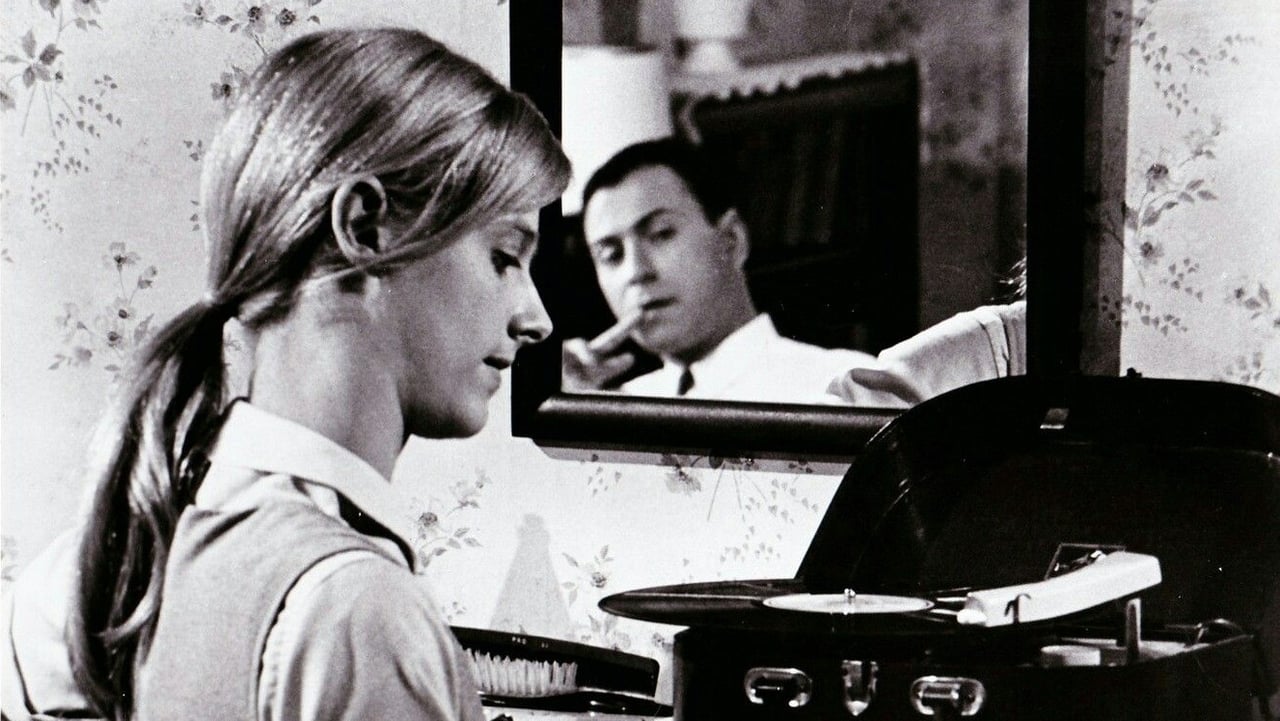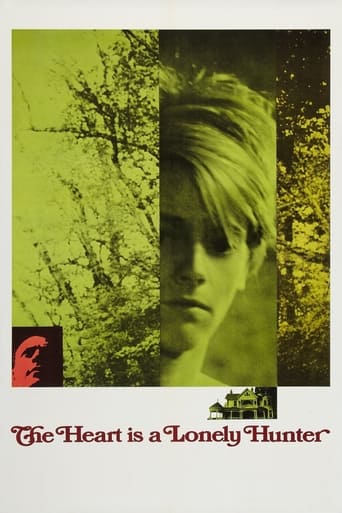

I was watching TCM to see who the actor of the day was since it is summer series. They were focusing on Alan Arkin. But it intrigued me that Cicely Tison and Sondra and Rodrigues were in the film! So, I decided to watch. Oh I had no idea what I was in for! I especially in my aging as a single person and a minority so understand the sensation of profound loneliness. It can twist your mind. You want to be with people and you want people to get along and see how they have a gift of relationships. I appreciate how the movie showed we all can be vulnerable...no matter the situation. Even when aggravated, frustrated or mad at each other we must see the value in our relationships. We need to value each other. Now more then ever in our technical age. My heart broke that he died feeling lonely. No connection. I hope I never make anyone feel unworthy!!! I will never forget this movie. Never!
... View MoreJohn Singer (Alan Arkin) is a deaf mute jeweler. His child-like friend Spiros Antonapoulos is also a deaf mute and gets into trouble. Spiros is put into a mental hospital and Singer moves to be closer to him. He rents a room from the Kelly family. Mick (Sondra Locke) is their self-obsessed teen. Blout (Stacy Keach) is a drunk. When Blout injures himself, Singer asks black Doctor Copeland to treat him despite any reservations in the segregated deep south.Singer is the magical being who brings salvation and happiness into these various lives in the pre-civil rights south. I'm not sure that Alan Arkin does anything particularly special to warrant an Oscar nomination. He does a good job being the great Alan Arkin without speaking. Sondra Locke is a little too old to play a teen but does a great job nevertheless in her debut. The race aspect is compelling and Percy Rodrigues is terrific. There are compelling scenes but the overall sense is a little meandering.
... View MoreAlan Arkin is John Singer, a deaf mute who takes an interest in practically everything and everyone around him. He wants to be the legal guardian for the mentally disabled Chuck McMann, who is first seen breaking the window of a pastry shop so he can eat the displays. To be near McMann (who is committed for observation), Arkin rents a room from physically disabled Biff McGuire and his tired wife, Laurinda Barrett, and slowly becomes friends with their lonely teen-aged daughter (Sondra Locke). He also befriends drifter Stacy Keach, whom he first meets while Keach is causing a drunken disturbance in a greasy spoon. When black doctor Percy Rodriguez refuses to take care of the injured drunken Keach, Arkin begins to work on him. Rodriguez, who is angry both at white people, as well as blacks who don't try to rise above their station in life, at first resists Arkin's intrusion in his life. His daughter (the brilliant Cicely Tyson) has married a man he refers to as an "Uncle Tom". Later, she tells him basically that he acts more white than white people do after he refuses to help her husband out of a disastrous situation that results in catastrophe. It is only through compassionate Arkin that the two are able to come to an eventual understanding. At his boarding house, Arkin wins Locke's trust by using her love of classical music to win her trust. It is through his upbeat look at life that seems to bring the people around him (including the surprisingly wise and kind drifter Keach) any sense of hope.It appears that Arkin's disability is a metaphor for the emotional disabilities that all these people are hiding from the world. Locke is initially hateful towards Arkin, but grows to trust him as her parents become more distant because of their own growing bitterness's. McGuire (in the type of role that Arkin might have later played) is quietly understated as the injured father whose inability to work has caused the family financial hardship. Barrett's fall from tired, hard working wife to slightly embittered mother who wants her daughter to drop out of school and work full time (while taking night classes), is also nicely subtle. Their characters reminded me a bit of the parents in "Breaking Away". Rodriguez is outstanding as the embittered black doctor who only treats Keach because of his pity towards deaf Arkin. The scene where he admits how ironic it is that at this point in his life, it is a white man to whom he can confide his deepest feelings, is so quietly powerful. Ms. Tyson, of course, is excellent; Already a stage veteran, she makes her character quite believable and the love for her husband most admirable.Stacy Keach is only in the film briefly in the first half, but makes a nice impression as the multi-layered drifter who has become a social outcast that only Arkin understands. As for Chuck McCann, as Arkin's child-like friend, he seems to really become this character. It is apparent that Arkin would never be able to take care of him, revealed in a powerful scene where Arkin uses a box of Whitman's chocolates to lure the sweets loving McMann away from a cake to get him to a court hearing. Arkin's good intentions are more than admirable, but ultimately leads to a tragic conclusion that will rip your heart out.Sondra Locke, best known in the 70's as Clint Eastwood's on and off screen partner in movies like "The Gauntlet" and "Every Which Way But Loose", has her best role as the teen-aged Mick. As I looked more closely at her, I was stunned by her resemblance to Allison Arngrim ("Little House on the Prairie's" Nellie Olsen) in both looks and facial expressions. She greatly deserved the Oscar Nomination she received, because she makes what could have been an annoying character really quite likable. She's not movie star beautiful, but there is something very unique in her that makes her quite special here.Without a doubt, there is no other word to describe Alan Arkin's performance than amazing. He really studied this character inside and out to get every niche of him down. There is no moment of unbelievability in his portrayal. While he lost the Oscar to Cliff Robertson's equally brilliant performance in "Charly", it must have been a really close race. "The Heart is a Lonely Hunter" is a much better film that unlike "Charly" and many other films of the 60's doesn't add a strange "mod" feeling into it that makes no sense.There are some terrific moral lessons to be learned from films like "The Heart is a Lonely Hunter". The biggest for me, based upon the tragic ending, is that in life, it is not only what people do in their lifetime that makes them special, but what they add to the lives of others around them (particularly strangers) that matters. We can give all the kindness in the world to our family, friends and partners, but if we ignore the opportunity to help someone we haven't brought into our lives, it takes away from our importance while here on this earth. The ending may have been tragic, but what lessons that other characters learned from Arkin's John Singer would change their lives eternally. Something tells me that Mick (Locke) would end up in social services helping disabled people, and that the black doctor (Rodriguez) would never again distrust all white people and be open to helping everybody who came to him.
... View MoreYou can read the many fine comments already made to appreciate why this is a superb movie that simply deserves to be seen. If you appreciate the story and want to see how actors and directors and the rest of the cast that make a film are there to tell the story, this is a good choice.It is evidence that Hollywood can make significant art, brilliant storytelling, and impacting entertainment.Alan Arkin and the whole film delivered. I saw this movie on an afternoon by chance on AMC or TCM and have never forgotten it. I might never forget this film.
... View More